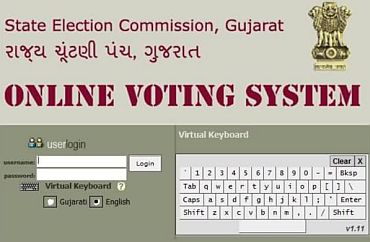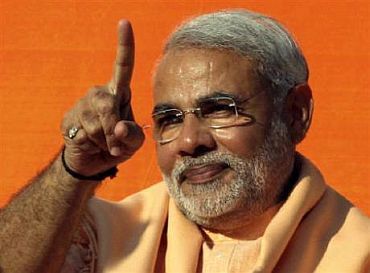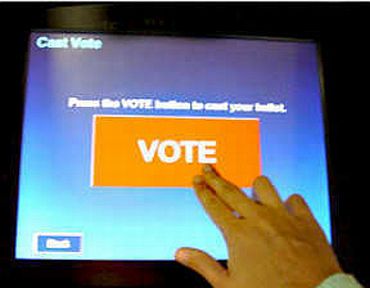
If we can buy things online, there's no reason why we can't vote online too. Lakshmi Ajay describes India's first experiment with voting via the Internet.
In a low-key, but potentially revolutionary experiment, Gujarat became the first Indian state to experiment with e-voting this April. The initiative came from Chief Minister Narendra Modi in January 2010, when he directed K C Kapoor, election commissioner of Gujarat, to find ways to take "voting to the next level so that more people were encouraged to vote."
Kapoor's answer: e-voting, which would be efficient, cost effective and hugely convenient compared to the traditional ballot boxes and electronic voting machines.
Strangely, e-voting has not caught on even in technologically-advanced countries, barring a few precedents such as Estonia (since 2005), the London municipal polls and the European Parliament.
...

Kapoor's team started by visiting these websites to get a feel of how e-voting was done. Next came a task-force of 30 government secretaries, tenders and notifications.
Gujarat Informatics Ltd was brought in as advisors, while Tata Consultancy Services was selected to provide software solutions. Vadodara-based Indusface, an information security agency, completed the team.
A data centre to hold biometric details of all the electoral wards was set up at Gandhinagar. "As security advisor, auditor and monitoring agency, we ensured that the online voting system satisfied four major requirements -- authentication, availability, confidentiality and integrity," says Indusface CEO Ashish Tandon.
The data centre, located on the 9th floor of the secretariat, has 32 servers. A data-recovery system will kick in within seconds in case the main servers are hacked; there is a back-up server at the Gujarat State Data Centre.
Any person whose name appears on the voters' list can e-vote. He must then register with the State Election Commission, filling out an online form with personal details, mobile phone number and details of the personal computer/laptop that he will use to cast his vote.
The voter is then sent a registration identity and temporary password via email and SMS. He must activate his identity within seven days of the alert. To prevent duplication of votes or bogus voting, the commission sends a new password on polling day.

With this, the voter can log on to the site and cast his vote. On October 10, 2010, the first e-votes were cast in the civic elections in Surat, Vadodara, Bhavnagar, Jamnagar, Rajkot and Ahmedabad.
The results were disappointing -- of 8.61 million registered voters, just 183 had e-voted! But Kapoor was excited. "Starting from 6 am when we rolled out the website, we fended off 4,000 attempted hackings from Pakistan, Taiwan and even China."
The Election Commission team then prepared to implement e-voting in a big way in the April 2011 elections to the Gandhinagar Municipal Corporation.
It had six months to iron out the glitches. "In the first rollout, people had to go to their electoral wards to get registered, so there was a lot of unnecessary paperwork. Also, if a family voted from one system, each person had to wait 15 minutes before the next one voted. We tried to remove these technical flaws," says TCS senior consultant Sanat Jethva, a member of the team that worked on the initiative.
This time, e-voting was a hit. Of 670 registered voters, almost 500, or close to 74 per cent, chose to e-vote. But not everything went smoothly.

Some like Yogesh Barot, a clerk in the state revenue department, tried to e-vote but the site would not load. Technicians were called in, but to no avail.
Still, by and large, e-voting had taken its first successful step in the world's largest democracy.
A team from Norway visited Gujarat during the polls to study the e-voting system. Closer home, Maharashtra is drawing up tenders for software developers, Karnataka is preparing a detailed project report and Andhra Pradesh and Haryana want to replicate the initiative.
One reason for the success of e-voting in Gandhinagar was the high Internet penetration. For e-voting to be successful elsewhere in the country, the penetration must improve.
It's a bumpy ride ahead but Kapoor is unfazed. He is toying with the idea of using e-voting in the gram panchayat elections this December. All he needs is the government's nod.